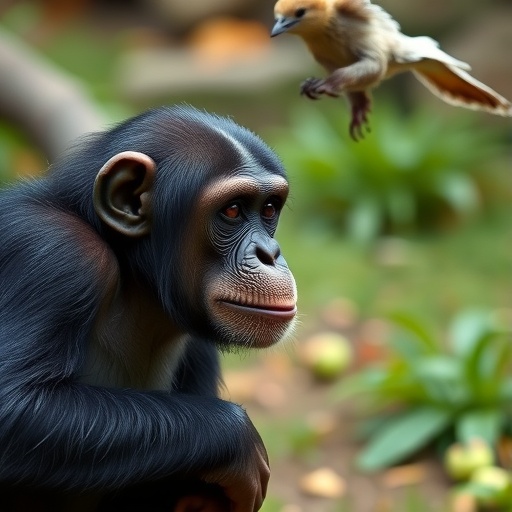Chimpanzees Rationally Revise Their Beliefs: New Insights into Primate Cognition
Recent groundbreaking research published in the prestigious journal Science challenges long-held assumptions about the uniqueness of human rationality. A collaborative study led by researchers from the University of California, Berkeley, Utrecht University, and several other institutions has demonstrated that chimpanzees possess the remarkable ability to rationally revise their beliefs when presented with new evidence. This discovery not only bridges a cognitive gap previously thought to separate humans from other primates but also sheds new light on the evolutionary origins of flexible reasoning.
In the carefully designed experiments conducted at the Ngamba Island Chimpanzee Sanctuary in Uganda, chimpanzees were faced with a straightforward choice: select one of two boxes, only one of which contained a food reward. Initial cues subtly indicated which box held the treat, but subsequently, the primates were exposed to stronger, conflicting evidence that favored the alternative option. Intriguingly, the chimpanzees frequently updated their decisions based on these new clues, effectively revising their beliefs with a level of rationality comparable to that observed in early human childhood.
This capacity for belief revision is a hallmark of rational cognition, involving the flexible integration of incoming information and reassessment of prior conclusions. Traditionally, such cognitive sophistication has been predominantly attributed to humans, emerging late in the developmental trajectory of childhood. However, this study reveals that the evolutionary roots of rational thought extend deeper, encompassing our closest living relatives. The researchers emphasize that chimpanzees demonstrate flexible reasoning skills previously underestimated by cognitive science.
To ensure that the chimpanzees’ behavior was not merely driven by simplistic heuristics or biases such as recency effects or responding to the most salient cue, the investigators employed rigorous experimental controls alongside computational modeling. These models tested various hypothetical reasoning strategies and found that the chimps’ choices aligned best with normative models of Bayesian updating—a formal framework describing how rational agents incorporate prior beliefs with new evidence to update their expectations. This computational approach strengthened the conclusion that chimpanzees engage in genuine rational belief revision rather than rely on rudimentary decision rules.
The experimental paradigm consisted of discrete trials where the primates’ initial box choice was carefully recorded. Upon presentation of subsequent, more compelling evidence favoring the alternate box, researchers tracked whether the chimps altered their initial selections. The statistically significant frequency of such belief updates, captured across numerous trials and individuals, underpins the robustness of the findings. Importantly, these results parallel the cognitive flexibility reported in children as young as four years old, suggesting evolutionary continuity in the mechanisms of belief revision.
Emily Sanford, a postdoctoral researcher involved in the study and a member of the UC Berkeley Social Origins Lab, remarked on the broader implications: “These findings compel us to reconsider the developmental and evolutionary landscape of reasoning. Recognizing that chimpanzees update beliefs rationally shifts the paradigm away from the notion that children start as blank slates. It invites a heightened appreciation of innate cognitive capacities conserved across primate species.” Her perspective highlights a transformative view that challenges educational and artificial intelligence frameworks predicated on underestimated primal cognitive abilities.
The multi-institutional research team included experts specializing in psychology, philosophy, and animal cognition. They integrated behavioral data with computational neuroscience models to dissect the underlying reasoning strategies employed by chimpanzees. This interdisciplinary synthesis underscores the complexity of primate cognition and rewards integrative methodologies bridging ethology, experimental psychology, and formal modeling—a convergence that is increasingly necessary to unravel cognition’s intricate architecture.
Looking forward, the research program is expanding to investigate belief revision in human toddlers, applying the same experimental design to children aged two to four years. By comparing developmental trajectories and reasoning efficacy across species, the team aims to construct a comparative framework mapping rational cognition across evolutionary lines. This promising direction advances the quest to decode how reasoning abilities emerge, mature, and differ across humans and our closest relatives.
Moreover, the implications extend beyond ethology and developmental psychology. Insights into naturalistic belief updating mechanisms can inspire innovations in artificial intelligence and machine learning. Current AI systems often struggle with integrating new evidence in a flexible and context-sensitive manner. Understanding how biological systems like chimpanzees dynamically revise beliefs presents opportunities to enhance computational models, potentially improving AI’s adaptability in complex, uncertain environments.
The study also prompts philosophical reflection concerning the nature of mind and rationality. By evidencing a continuum rather than an absolute divide between human and non-human primates, it challenges anthropocentric biases and opens new vistas for ethical considerations in the treatment and appreciation of animal cognition. It encourages scientists and the public alike to acknowledge the sophistication and nuance of animal intelligence beyond traditional benchmarks.
Finally, the researchers stress that their findings should motivate renewed respect for animal cognition as they negotiate complex social and ecological landscapes using flexible and adaptive strategies. While chimpanzees do not engage in scientific reasoning as humans understand it, their capacity for evidence-based belief revision demonstrates a level of intellectual engagement that merits scientific, educational, and societal attention. This study marks a pivotal step in recognizing the cognitive richness embedded in the evolutionary tapestry of life.
Subject of Research: Animals
Article Title: Chimpanzees Rationally Revise Their Beliefs
News Publication Date: 30-Oct-2025
Image Credits: Sabana Gonzalez / Social Origins Lab
Keywords: Chimpanzees, belief revision, rationality, cognitive flexibility, primate cognition, Bayesian updating, decision-making, Social Origins Lab, early childhood reasoning, artificial intelligence, comparative psychology




